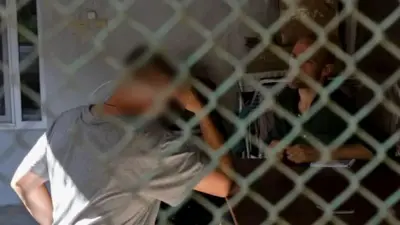We've updated our Privacy and Cookies Policy
We've made some important changes to our Privacy and Cookies Policy and we want you to know what this means for you and your data.
St Kilda's rare seabirds are tagged and tracked
Image source, RSPB
Conservationists hope to gain new insights into one of the UK's rarest breeding seabirds.
RSPB scientists spent a month catching and tagging Leach's storm petrels on the remote St Kilda archipelago over the summer.
The group of islands and rocky sea stacks west of North Uist in the Western Isles hosts 94% of the UK population of the starling-sized bird - the largest colony in the northeast Atlantic.
The birds spend daytime at sea, only returning to land, and the nests they make in burrows, at night - which was when they were tagged.
Image source, RSPB
The RSPB said the storm petrels make "bizarre chattering and churring noises".
The sound is described by the Collins bird guidebook as like "a pixie chuckling and being sick".
But there are serious concerns for the species because numbers have suffered from "severe decline".
It is listed as vulnerable to global extinction by the International Union for Conservation of Nature's Red List.
Image source, RSPB
The RSPB team tagged and tracked 14 LeachÔÇÖs storm petrels on St Kilda.
Scientists will analyse the data gathered by the devices to find out where the birds are looking for food, and the threats they might be facing while on the wing at sea.
A further 20 birds were fitted with a different type of tag which will gather information for a whole year.
Leach's storm petrels spend the winter in the tropics. The tagged birds will be caught and have their tags removed when they return to St Kilda next year.
The project is being carried out on behalf of Marine Scotland.
Top Stories
More to explore
Most read
Content is not available








